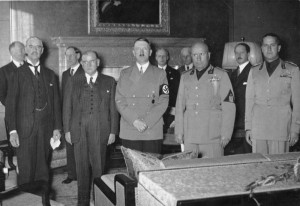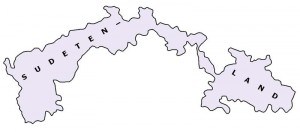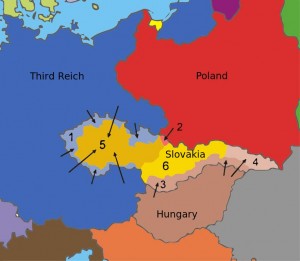The Munich Agreement of 1938 was a settlement between four European powers. It allowed Nazi Germany to occupy and annex certain parts of Czechoslovakia which were inhabited largely by people of German descent. At the time, the agreement was widely seen as a peaceful resolution, but Adolf Hitler’s refusal to honor it long-term relabeled it as a failed act of appeasement. Neville Chamberlain, the British prime minister who negotiated with Hitler, was replaced in 1940 by the far more combative Winston Churchill.
Background
Germany had invaded and annexed Austria during the Anschluss in March of 1938. Once this had been achieved, Hitler’s next target was the Sudetenland, a part of Czechoslovakia which was, for the most part, ethnically German. Czechoslovakia itself had existed only since the conclusion of World War I, and had always been nervous of German territorial ambition. The Sudeten German Party, brought into being in 1931 by Konrad Henlein, explicitly called for German control in the region. Sudeten Germans gave the party strong support, although the Czech government refused to recognize it.
The Czechoslovakian government was staunchly opposed to any loosening of its control over the Sudetenland, given that the region was of great economic importance due to its industry and natural resources. It therefore signed military alliances with the Soviet Union and France, as well as improving defenses along the mountainous border with Germany.
A Growing Crisis
In 1938, Hitler ordered his commanders to plan for an invasion, and simultaneously instructed Henlein to stir up discontent. He hoped that his followers would provide the Germans with an excuse to go into Czechoslovakia in order to contain the “uncontrollable” Sudeten Germans. The Czech government, fearing this precise course of action and considering where it might lead, declared martial law throughout the Sudetenland, but this only made Hitler more resolved. As a result, he issued strident demands that the region should immediately be transferred to Germany.
By now, the fear of another world war was hovering over Europe. Both France and the United Kingdom, despite being major military powers, were unprepared for conflict of such a scale and therefore sought a way to avoid it. Neville Chamberlain, the prime minister of Britain, contacted Hitler and asked for a meeting to explore ways in which war could be avoided. Hitler agreed to meet Chamberlain in Berchtesgaden on September 15th.
Hitler was ready for Chamberlain and made sure that his previous demand regarding the cession of the Sudetenland was repeated, emphasizing that the ethnic Germans in the region were being persecuted by the Czechs. Chamberlain felt that such a concession was too much, especially without having discussed it with his cabinet colleagues, and asked Hitler to stay his hand until the consultations had been carried out. Hitler agreed to the request but did not stop his military planning. He offered Hungary and Poland a bargain, stating that if they allowed Germany to annex the Sudetenland, they too would be granted sections of Czechoslovakia.
Chamberlain Agrees
After having discussed the matter with the British cabinet, Chamberlain received the go-ahead to allow Germany’s annexation of the Sudetenland, with France also in agreement. They met with representatives of the Czech government on September 19th to recommend approval of the plan, and Czechoslovakia, left almost isolated, had little choice but to accept its fate. Chamberlain returned to Germany for a follow-up meeting with Hitler, and was startled to receive further demands from the German leader.
Hitler had reconsidered and stated that allowing German control only of those Sudeten areas where ethnic Germans were in the majority was unsatisfactory. He not only insisted on control of the whole region, but also demanded the complete expulsion of non-Germans as well as territorial concessions of Hungary and Poland. Chamberlain refused to accept these new demands but was told that the alternative would be war. The British prime minister was forced to go home, having failed to achieve the plan he had staked his reputation on.
The Munich Conference

Chaimberlain, Daladier, Hitler, and Mussolini
at the Munich Conference
Photo by: Unknown Creative Commons
By now both Britain and France were commencing mobilization, and Hitler discovered that there was little support for war at home. He therefore wrote to Chamberlain again, with the offer of guaranteed sovereignty for Czechoslovakia as long as Germany was ceded the entire Sudetenland. Chamberlain, desperate to avoid war, asked Benito Mussolini of Italy to help him persuade Hitler to agree to further talks. Mussolini’s proposal, which Hitler accepted, was a summit meeting of four powers: Britain, France, Germany, and Italy. The Czechs were excluded from discussing the fate of their own country.
On September 29th, the leaders of the four powers met in Munich, and talks continued long into the night. A delegation from Czechoslovakia had come, but was not admitted to the conference room. Mussolini suggested a plan whereby Germany would gain the whole of the Sudetenland, but would then refrain from any further expansionist moves. In fact, what he presented to the other nations was similar in its main respects to the ultimatum which Hitler himself had so recently delivered to the British leader.
Chamberlain was still determined to prevent a war, and both he and French Prime Minister Edouard Daladier accepted the proposal. In the early hours of September 30th, the Munich Agreement received the signatures of all powers present. The terms of the agreement authorized Germany to occupy the Sudetenland on the following day. There was then to be a ten-day period after which the annexation should be completed. The Czech delegation was effectively forced to agree to these terms, having been told that there would otherwise be war for which Czechoslovakia would be blamed.
Aftermath
Sudeten Germans welcomed the Nazi troops into the region on October 1st, although a large number of ethnic Czechs were forced to flee. Hitler was both delighted and surprised that he had been able to take the Sudetenland without a fight. Chamberlain returned to London to a hero’s welcome. Cheering crowds in Downing Street heard his announcement, later to become infamous, that the negotiations had produced “peace for our time.” The British government was split on whether Chamberlain’s actions had been successful, with the loudest voice of opposition belonging to Winston Churchill, who called it an “unmitigated defeat.”
Hitler, now convinced that the western European powers would not interfere with his conquests further east, pushed Hungary and Poland to take their shares of Czechoslovakia. He then ordered his own troops to occupy the remaining part of the country in March of 1939. Again, neither France nor Britain responded militarily, although they did provide Poland with a guarantee that its own territory would be defended. On September 1st, Germany’s invasion of Poland activated the newly-signed military alliances and brought about the start of World War II.

